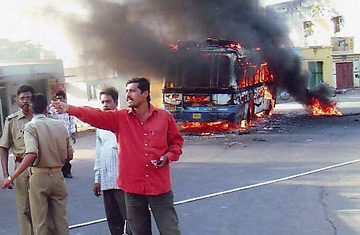
A bus set on fire by protestors goes up in flames at Baliguda in Phulbani district in Orissa state, India
The violence that has wracked India's eastern state of Orissa over the past few days seems, at first glance, to be purely religious. On Christmas Eve and Christmas day, Hindu nationalists in the Kandhamal area attacked churches and convents and set fire to houses belonging to Christians, killing one person and injuring at least two dozen more. Since then, more than forty Christian houses have been set ablaze despite curfews and increased police patrols. Local Hindus say the violence began after Christians attacked a Hindu leader. Christians say the attacks — the latest in several bouts of religious violence that have plagued the state over the past few years — were sparked by church plans for a performance to celebrate Christmas.
As with most communal violence in India, this latest explosion of hatred is the result not only of religious differences but of a tangled intersection of political power, communal prejudice and the injustices of Hinduism's archaic caste system.
Orissa is predominantly Hindu, with a small Christian minority. Over the past few years, though, thousands of Hindus have converted to Christianity. Many converts, and the churches they join, say conversion is a way to escape their place in the complex social hierarchy of Hindu caste. While discrimination based on caste has been officially barred for years, it lives on in many parts of society. For groups such as the Dalits, or "untouchables", occupying the lowest rung of the caste ladder, it can mean a life of hardship; unsurprisingly, it is this group that accounts for the most converts to Christianity. By becoming Christian, converts say, they move outside the caste system and can hopefully become more socially mobile.
But India's right-wing Hindu groups and political parties allege that Christian groups are forcing Hindus to convert against their will, in an effort to change the nature of India. "They want to convert people to Christianity and convert the country into a Christian land," Swami Laxmananand Saraswati, head of the Vishwa Hindu Parishad (World Hindu Council), one of India's biggest Hindu nationalist groups, told Indian reporters. "We are opposed to that and that is the source of all disputes and fights." Other low-caste groups and so-called "tribals" — ethnic minorities who stand outside the caste system but have historically been poor and neglected — who benefit from affirmative action programs that reserve for them government jobs and school places, worry that minority Christians may one day receive affirmative action places themselves — diluting their chances of moving up India's social ladder. Groups such as the VHP play on those fears in an attempt to unite India's diverse Hindu population against the Christian or Muslim "outsiders," says Ashis Nandy, a political psychologist and sociologist at India's Centre for the Study of Developing Societies. "If you can identify a common enemy it is easier to unify all these Hindu groups" that, in the view of Hindu nationalists, should "work together to save Hinduism."
One of the hard-liners' main frustrations is the fact that Hinduism is inherently tolerant of other religions and allows that they too could be valid alternative paths to enlightenment. Proselytizing as Christians and Muslims do is, by its nature, un-Hindu, which makes a looming battle for Indians' souls look "very asymmetrical," says Nandy. For Hindu nationalists, the fear of Hindu conversions to Christianity "is a kind of humiliation that is being rubbed in," he says. Ironically, of course, Hinduism's acceptance of other religions is used by extremists as an excuse for hostility towards other religions. "The source of tolerance has become a source of bigotry," says Nandy. Which is why this week's upheaval won't be the last.
